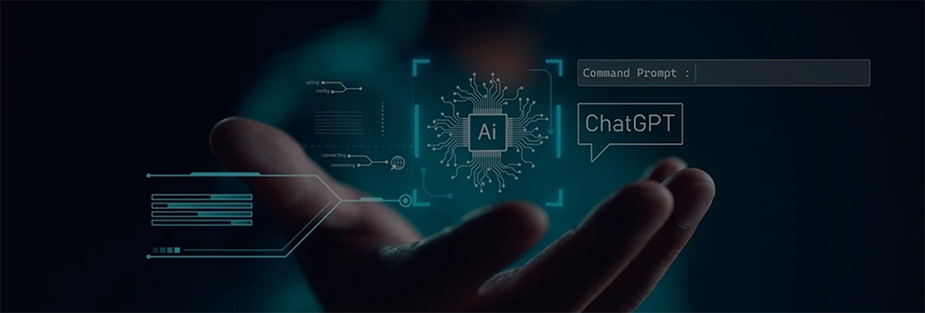
What is the impact of ChatGPT and AI on the mobility industry?
With ChatGPT, we may be able to manage and engage with consumers and, ultimately, relocate customers forever. Impact of ChatGPT and AI is significant in web world.
Recent buzz has centered around ChatGPT-3 (Generative Pre-trained Transformer). This is not a fly-by-night technology. Marketing and lead management are already incorporating it. MLS property descriptions are written with it for real estate agents, for example. Ultimately, it will transform the way we manage consumer engagement and relocation referrals forever. While you may think that mobility should only have a human touch, hold your judgement until you continue reading.
Information is mostly understood using artificial intelligence (AI). A generative model is a method of creating new data and content by using large language models (LLMs). A LLM is a probability model that predicts and produces information in terms of language patterns. There are now more powerful elements called transformer-based models that analyze data points, patterns, and information to connect different prompts with specific solutions.
On November 30, 2022, ChatGPT was launched as a prototype and quickly gained attention for its detailed responses and articulate answers across many domains. Using both supervised and reinforcement learning techniques, it was fine-tuned (an approach to transfer learning) on top of OpenAI’s GPT-3 family of large language models.
Some real estate agents and companies are already using ChatGPT to pre-screen internet leads and set up appointments. Almost all website chatbots you interact with when making an online inquiry are powered by some form of artificial intelligence.
ChatGPT’s Power: Why We Need to Understand It
Do you remember when cellphones first came out, and then creators took it to the next level by allowing us to text? That seemed so advanced to us. It never occurred to us that we could run a business and live our lives on a smartphone. Our cameras and watches could be discarded, and questions could be answered in a second. Nevertheless, we are here.
AI may seem like robots and movie magic to you. We have been surrounded by dystopian AI movies for years, but it all seemed far-fetched and Hollywood. In reality, however, art imitates life, and the very things created by writers are now beginning to resemble reality.
What can ChatGPT do for you? It can be used for:
• Brainstorming
• Perform research
• Develop a strategy
• Conduct negotiations
• Design social media posts and invitations
• Write content, scripts, songs, and poetry
• Creating custom graphics and images
• Create automated emails
• Transcribing audio interviews
• Write summaries of articles and documents
• Taking tests
• Troubleshoot computer programs
• Acknowledge its errors
• Engage us in a full-on conversation
It’s on the way
To manage data points, ChatGPT was created by humans. Currently, ChatGPT version 4, which was released recently, is trained on 100 trillion parameters. In fact, AI is not powered by the internet; it is the opposite.
ChatGPT will be used by Microsoft’s Bing search engine. We don’t claim to be Binging something; we say we’re Google-ing it. This is a game-changer for Microsoft. 1 million people were on the waiting list for the beta within 2 days of announcing the upcoming Bing launch powered by ChatGPT. According to Statista, Bing has 1.2 billion users worldwide. According to Statcounter Global Stats, Bing has only about 4% of the world’s search market, compared to Google’s 92%. Following a failed soft launch with glitches, Google recently implemented its AI model Bard AI to power the Google chatbot.
When we engage with AI, we can still fool it. However, most people just want answers and don’t care if a human is behind them. Providing the information they need and ensuring it is accurate is all that matters. As time passes, it becomes more sophisticated and develops more capabilities. Requests that are inappropriate will be rejected and the system will correct itself.
While it’s not supposed to be political, some say it has some algorithmic bias based on prompts given by humans. There are some heavy users who claim it has a dark side. Despite the fact that AI lacks a moral compass, a user’s dark prompts may be reflected by the AI. It is readily acknowledged on the OpenAI website that some information may be incorrect. Currently, ChatGPT is the most sophisticated AI model available. We must consider this a public beta test since it just launched in November 2022. It will have flaws, and users will spend time trying to figure out how to fix it.
Since recently, OpenAI has limited Bing chats to five questions each, with a limit of 50 chats per person per day. It was becoming evident that long chat sessions confused the AI system, which previously allowed people to chat for hours. There was no sense in the answers or they were delivered in a tone that was inappropriate and indicative of the chat partner. Occasionally, it abruptly ends the conversation by saying “I’m still learning, so I appreciate your patience and understanding.” Well, at least it’s polite.
It’s all about the prompt.
Our ability to get information from this type of AI depends on the prompts we give it. It’s important to be specific. Writing the prompt is less important than engineering it. For instance, if I wanted to summarize an article I read or a class I took, I could apply AI to that material with specific prompts. A beautifully written summary would be available to me. I guess it is still catching up to current events since it does better with data requests prior to 2022.
ChatGPT still needs to be read at this point. It is a dream come true for poor writers. If we want it to write something romantic, practical, or business-like, we can actually direct it in that direction. A detailed prompt can prompt it to write poetry or rap lyrics. Many types of AI programs are already available; even Canva and LinkedIn can use AI to create custom images and content.
Let’s make good use of it
There are good and evil uses for artificial intelligence. Videos of prominent people saying things they did not actually say have probably already been manipulated. Using AI, we cloned voices and manipulated images and videos.
The problem with this kind of technology is that it is rapidly advancing, so there should be some legal guidelines for governing it. Creators must self-monitor, but the moment they sell their technology, they lose control. For the most part, the creators of newly created creations have the best of intentions for them (think social media). Nevertheless, there are malicious people planning how to impersonate or extort someone right now. We have a problem in that our government leaders who actually make laws don’t understand advanced AI learning. By the time any government regulations are implemented, the cat will already be out of the bag.
There’s no need to fear it
One person asked the other day, “Won’t this type of AI eliminate jobs? That’s for sure … eventually. Has the horse and buggy been eliminated by cars? Yes, but it also created thousands of jobs in the road building and car manufacturing industries. As a result, certain skills and jobs are traded for others.
Is AI going to replace relocation and mobility staff? Besides pre-screening transferees, it may also assign agents and brokers, schedule and monitor move progress, and adjust accordingly as it engages in conversations with prospects. Based on previous similar situations and data points, it can respond appropriately. CRMs and referral management software are already doing some of that.
Ultimately, someone will need to make sure all of those moving parts work together and provide what all stakeholders need. It is possible that your staff will shift their focus to new business, strategic planning, and training supported by artificial intelligence. Or they may use AI to resolve complex problems under their supervision, which may also be powered by AI. Experience cannot be exchanged for data points, but historical data can reinforce what we already believe. It may be necessary to elevate the skill set a bit, which might mean hiring individuals with larger-picture thinking, but more automation would save money in the form of fewer lower-level employees.
The relocation industry is often described as a people business requiring a lot of handholding and personal attention. There are certain things that need to be handled with human benevolence, and I do not disagree with that, but I do believe that many tasks or processes can be automated based on what we have learned over the years in order to eliminate some of the flaws associated with human-driven processes or tasks. If used in its intended capacity, AI won’t take over the world, but it can simplify some tasks and functions. Get on board and be a part of this AI revolution that is transforming business for the better. Impact of ChatGPT and AI is significant.
Embark on a journey
You can explore ChatGPT for free at openai.com/blog/chatgpt. Check out this article about setting up an account and using it: https://www.businessinsider.com/how-to-use-openai-chatgpt-viral-ai-chatbot-steps-photos-2023. Have a great time learning AI!The founder and principal of TRH Consulting is Teresa R. Howe, SCRP, SGMS. To help companies generate more revenue, get more customers, and create loyal fans, she coaches and consults in the relocation, mobility, and real estate industries.
Plan Stress-free Move with Top Moving Company in UAE - ISS Relocations

Moving Company - Recent Blog
Stay informed and prepared for your next move with our latest blogs on moving services in the UAE. From expert packing tips to international relocation guides, ISS Relocations brings you up-to-date insights to make your moving experience smoother, safer, and stress-free.










